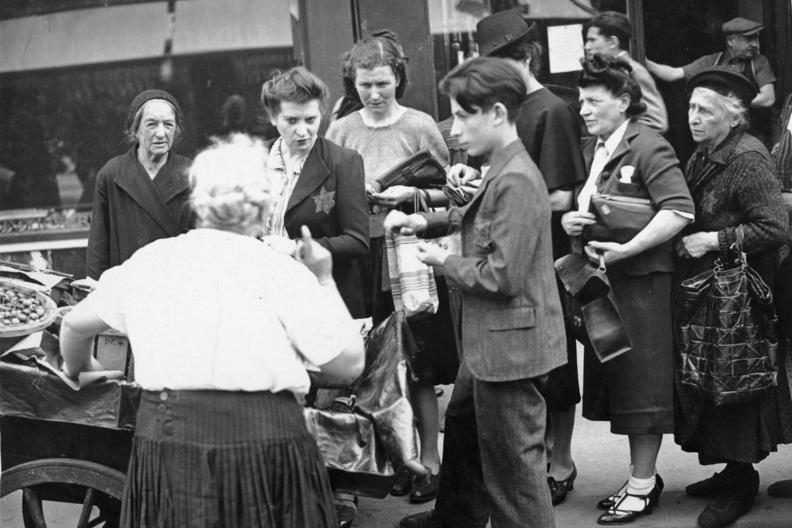
Occupation Societies
Prof. Dr. Tatjana Tönsmeyer/ History
Photo: Private
The societies of absent men
Tatjana Tönsmeyer organizes conference on occupation societies of World War II.
"Our research is very topical in a sad way," says Prof. Dr. Tatjana Tönsmeyer of the Department of Modern and Contemporary History at Bergische Universität. The historian studies World War II occupation societies and the impact of occupation on the everyday lives of the people affected.
For more than a year, Russia's war of aggression on Ukraine has troubled the lives of everyone around the world. The plight of those who have since lived in the current war zone and especially in the Russian-occupied parts of the country is much the same now as it was then. Tönsmeyer thus dedicates himself to a topic that is still largely unexplored in the historical debate.
Life under occupation
The professor heads an international research network on the occupation societies of the Second World War. A good 200 million people lived under the influence of the German occupation in the occupied territories. So far, not much is known about their lives. "There are still many gaps in research," says the expert, but what is clear is that the German occupation intervened in every aspect of people's daily lives. Over the course of the war years, the occupation territories stretched from western and northern Europe to the east and southeast of the continent. In Eastern Europe in particular, the occupiers were extremely violent from the beginning, using the resources of the subjugated territories for their own armament purposes and exploiting them dramatically. "This in turn had massive consequences on supplies. What people knew as normal before no longer existed with occupation."
Dealing with shortages
Together with Peter Haslinger of Justus Liebig University in Giessen, Tönsmeyer has published a two-volume source edition titled "Fighting Hunger, Dealing with Shortage" (' Den Hunger bekämpfen, mit dem Mangel`), which focuses on the everyday lives of people under occupation in Europe. "You can understand the consequences of these acts of war if you hold a map of the period in your mind`s eye," the researcher explains. "It was, after all, a very large Europe, from northern Norway to the Mediterranean, from the French Atlantic coast to well into what was then the Soviet Union. Everywhere in those areas, people suffered shortages very quickly and had to deal with it." In many cases, basic foodstuffs were no longer available in stores, so people tried to obtain supplies on the black market. Prices there were extremely high. "At the same time, people thus violated the laws of the occupiers, because the black market was criminalized and there was a threat of arrest." The source edition includes numerous examples from letters and diaries that attest to people's hardships. For example, a Belgian diarist writes that he had already lost 16 kilograms in the first year of the occupation. The situation of people in Eastern Europe at that time was even more dramatic. "In the Soviet Union at that time, the German occupiers staged a real starvation policy," says Tönsmeyer, describing the situation, "there were many deaths from starvation." A city in Ukraine, which has been in the media for months because of its tragedy, also led the statistics at that time. According to Tönsmeyer, "Kharkiv, for example, had the most starvation deaths during the years of World War II. But other Soviet cities, Greece and likewise the Netherlands also had an enormous number of starvation deaths in the so-called Hunger Winter of 1944/45."
The occupiers ordered compulsory work, but people became weaker and weaker, trying to obtain substitute food on the black market, some collapsing at their workplaces. "We have sources where people report that they had eaten food for animals. And from October 1941, we have the warning of the prefect of Paris, who warns the city population not to eat cooked cat meat because it transmits diseases."

Paris, women with Jewish star shopping, 1942 Source: Bundesarchiv, Bild 183-R99297 / CC-BY-SA 3.0
Women responsible for family
The source edition follows the concept of occupation societies, and Tönsmeyer says, "We show how these societies functioned." It was a society of absent men, she explains, because one has to imagine that the fathers were either conscripted to the war, or had already been captured, wounded or even killed. These families therefore lacked breadwinners. "These societies were made up of larger percentages of women, children and old people than in peacetime." In this context, he said, children and the elderly should be considered needy people who needed support even in normal situations. In addition, workers were repeatedly deported to the German Reich for armament purposes, so that life was characterized by constant fear, the researcher explains. In this situation, it was mainly the women who tried to keep the family together, to feed it and to find protection. Here again, the parallel with the Ukrainian war suggests itself, where a situation similar to that of 80 years ago in the Second World War prevails. "I have met people myself who fled Ukraine shortly after the war" says Tönsmeyer, "they have always told me that they know what occupation means either from family stories or from school and they say, 'I definitely don't want to experience that.' There's no way I want to live under occupation! ` Then they flee to Germany and find that occupation is not a big issue here."
Last fall, the German-Ukrainian Historical Commission hosted a seminar in which a Ukrainian scholar who has lived in an area under occupation for a time reported on the current situation in the country. Tönsmeyer herself gave a presentation on her historical research at the same time, noting, "There we could see that the violence lurking around the next corner, the fears while shopping, the apartment that is no longer a safe retreat because occupiers are banging on the door and you can't do anything as a civilian, the fact that you can't get reliable information anymore, characterize the past and the present."
600 sources from all over Europe
The printed editions, as well as an additional online portal, contain some 600 informative sources, Tönsmeyer reports, drawn from some 70 archives from all European countries that were once occupied by Germany. Among them are diaries, letters, petitions, as well as market regulations and decrees. "From about 20 languages, we have translated these sources into English. In the online portal, there is also an original-language transcript and the option of calling up original scans. So the portal offers a lot of additional possibilities," she adds.
To make the everyday restrictions comprehensible, the researcher cites the perfidious example of a market order from Ukraine. "In it, the German commander specifies in detail when what may be sold at the market, how the stalls are to be labeled, and that sales on the paths would be severely punished. Then follows a very long list meticulously detailing what may not be sold, for example, no meat, but also no dairy or grain products. When you read that, you ask yourself: what is left at all? And then at the end it says: everything else is free for sale."
The edition now shows how people deal with these requirements, he said.
Conference in Wuppertal deals with local administrations under occupation
The framework within which local people could operate in the occupied territories was very limited. The conference initiated by Tönsmeyer in Wuppertal is dedicated to this situation under the title 'Occupied Societies and Local Administration`. "This space from northern Norway to the Mediterranean and from the French Atlantic coast far into the then Soviet Union is so large that the German occupiers always needed local personnel to have their orders enforced" explains the researcher. Many of her sources therefore do not come from files of the supreme authority in Berlin, but are local and regional decrees. "You can see that local administrations played a big role everywhere in the occupied territories in Europe because they were made stooges of the occupiers, so to speak, to realize their goals." These mostly local administrative bodies organized everyday administrative management, controlled market regulations, issued food rations, and made arrests. "As part of the conference, we will look at policing, it will be about courts, social and health policy, and also phenomena like denunciation," Tönsmeyer explains, continuing, "You have to realize one thing: Wherever people went to the office, the head of the office may have been a German, but those you dealt with at the counter were probably locals." Thus, the mediation of commands and prohibitions by native administrative people led to faster acceptance.
The numbers of people working in the authorities also grew under occupation, and there was a logic to that, the researcher explains. "For one thing, these Germans are fanatical about control. There are masses of rules, commandments and prohibitions, all of which they want controlled, and for that they need staff. For another, I talked at the beginning about people being taken away to work on a grand scale. And women in particular hoped that if they had a job with the authority, one of these local governments, they could escape deportation." Local women could continue to care for their children or sick relatives and thus would have had an interest in working in this type of authority. But this activity could have disastrous consequences for other people. "It is also these authorities that had to register the Jewish population. We know how different everyday life was under occupation, but Jewish people were once again particularly affected" Tönsmeyer underlines. "They had the lowest food rations, they were the most dependent on the black market, and they only had rations in Eastern Europe on which one could not survive. Local governments were thus pressed into service for German domination goals, including murder policies. A lot of exciting research has been done on this recently, and we want to discuss it."
International award received
The current warlike actions in Ukraine give Tönsmeyer`s research on occupation societies additional significance, which has also been honored internationally. The 'American Library Association`, the umbrella organization of libraries in North America awarded the source edition co-edited by Tönsmeyer. "We were particularly pleased about this because it is a new topic and we have attracted attention with this new topic. Moreover, it is a project that is centrally located at the Bergische Universität Wuppertal. We have also managed to maintain a standard in English that normally only native speakers have."
Uwe Blass
Tatjana Tönsmeyer studied history, Eastern European history, political science and journalism/media studies at the universities of Bochum and Marburg and received her doctorate in 2003 from the Humboldt University in Berlin, where she worked as a research assistant until 2011. She habilitated at the Friedrich Schiller University in Jena and has held the Chair of Modern and Contemporary History at Bergische Universität since 2011.
